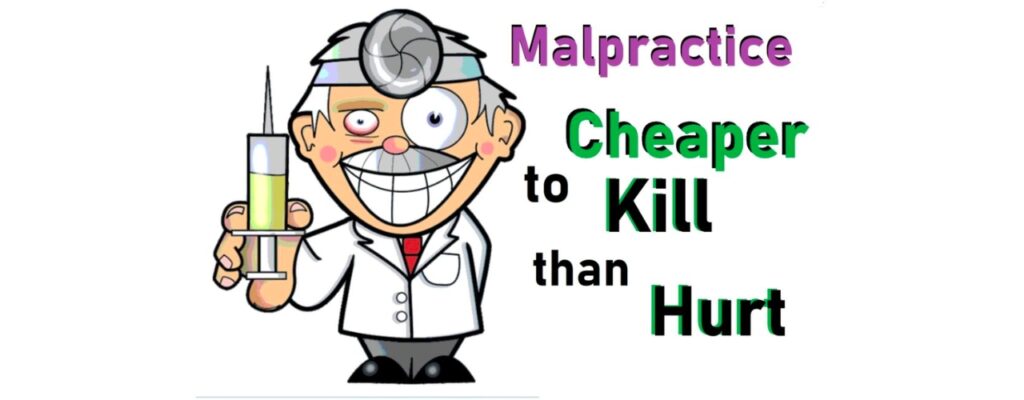Patient #1 – Stephens Johnson Syndrome

A patient goes to the doctor for a common cold.
- He is sneezing; he is coughing.
- He is running a fever.
- He tells the doctor he is allergic to antibiotics.
In spite of this, the physician prescribes Ceftin for the infection, and Motrin for pain.
Patient #2 – Catheter Extravasation

A patient has cancer. She needs to take the chemotherapy drug Vincristine intravenously so that this liquid medication can reach the target cancer.
The medical professional erroneously administers this irritant solution. The Doctor pushes the needle too far. Instead of going where it’s supposed to, the chemotherapy medication drips into the body. There is progressive blistering, inflammation, dead tissue, and worse.
Cheaper Dead than Alive.
One of these patients lives; one of these patients dies. It may amaze you to learn that the patient that lives likely has a much more valuable case than the patient who died. This article explains the differences between damage awards in malpractice wrongful death cases and malpractice personal injury lawsuits.
The Test For Personal Injury Malpractice
To win a personal injury (non-death) medical malpractice case whether it be a situation like Stevens – Johnson Syndrome, a prescription drug error, or extravasation, the test is as follows:
- First, the victim must show the physician did something or failed to do something his profession requires;
- Second, the doctor must be found negligent. This means a “the failure to use that degree of skill and learning ordinarily used under the same or similar circumstances” by members of his profession.
- Third, the victim needs to show she was damaged as a direct result of the doctor’s failure.
Paraphrase of M.A.I. 21.01 (1988 Revision) and M.A.I. 11.06 (1990 Revision).
Legislative Limits On Malpractice Compensation

Many states have enacted legislative “caps.” These caps place a ceiling on the maximum amount any innocent victim can recover for medical malpractice. For example, Missouri Statute § 538.210 places a cap on damages against any healthcare provider for injury or death they may cause. It also places a cap on the surviving spouse’s damages.
The cap on damages for 2018 non-catastrophic economic damages amounts to $420,749. This means a personal injury medical malpractice drug victim with a million dollars in damages can recover the full million dollars they have lost. If they die, the family can recover less than half that amount, even though the damages are far greater.
The Unconstitutional Cap on Personal Injury Drug Error Cases
The Supreme Court in 2012 found that for personal injury actions, any legislative cap on the total amount of damages a victim may recover violates their Seventh Amendment Right to Trial by Jury, also guaranteed by Article I, Section 22 (a) of the Missouri Constitution. Watts v. Lester E. Cox Medical Centers, 376 S.W.3d 633 (Mo. banc 2012). This constitutionally allows injury victims of drug errors full compensation up to the reasonable amount as determined by the judge or jury.
There Remains a Cap Limit on Death Cases
Why are wrongful death cases different? It is an old distinction from before the English Common Law. Traditionally, Julias Caesar is quoted as beginning the expression “mortui non postulant” translated as “dead men don’t sue.” In wrongful death cases, as opposed to personal injury cases, death mattered.
There was no right for the family to sue on behalf of a dead family member irrespective of the damage or how bad the conduct was. This led to many unfair situations. The legislatures stepped in and passed the wrongful death statutes.
Why Wrongful Cases Can Have Money Limits
The case of Dodson v. Ferrara, 492 S.W.3d 542, 544 (Mo. 2016) came along. In Dodson, the Supreme Court ruled that wrongful death remains a creature of statute. In weighing cap rights, you are not dealing with constitutional rights. The legislature of a state can control a lawsuit that it created by taking money away from innocent victims, if that is the legislature’s desire.
In short, lawmakers can define the recovery if the lawmakers create the type of lawsuit. Id. Here, since lawmakers passed the wrongful death statute, so too, the lawmakers can limit the death recovery. See Sanders v. Ahmed, 364 S.W.3d 195, 200 (Mo. banc 2012).
A Victim’s Constitutional Rights Don’t Matter.
- Does equal protection matter?
- How about separation of powers?
- What happened to the victim’s trial by jury right?
- What about cases with aggravating circumstances?
The Supreme Court considered all of these factors. It ruled no such Constitutional rights matter and only apply to personal injury claims. Watts v. Lester E. Cox Medical Centers, 376 S.W.3d 633 (Mo. banc 2012).
When Constitutional Rights “Stick”

Unlike wrongful death lawsuits, the common law existed before our Constitution. That court-created law recognized personal injury lawsuits. Therefore, the Constitution adopted those protections and a legislature cannot pass a mere law to limit those Constitutional rights.
This may seem unfair and a breach of essential rights. Indeed, the Supreme Court of Missouri has gone so far as to state “guarantees do not mean that the State may never make distinctions between individuals or groups of people.” Further, “the state may treat different groups differently. Comm. For Educ. Equality v. State, 294 S.W. 3d 477, 489 (Mo. 2009).
What to Do
It is important to have a lawyer with specific experience with both wrongful death and personal injury cases. Extravasation can cause injury. Extravasation can cause death. Drug errors can lead to Stevens – Johnson Syndrome. Stevens – Johnson Syndrome can progress to Toxic Epidermal Necrolysis. T.E.D. and can cause death.
The difference between an injury and death can mean millions of dollars of differences in case value, irrespective of other circumstances. This distinction must be looked at from early in a case to avoid the trap, when possible.



